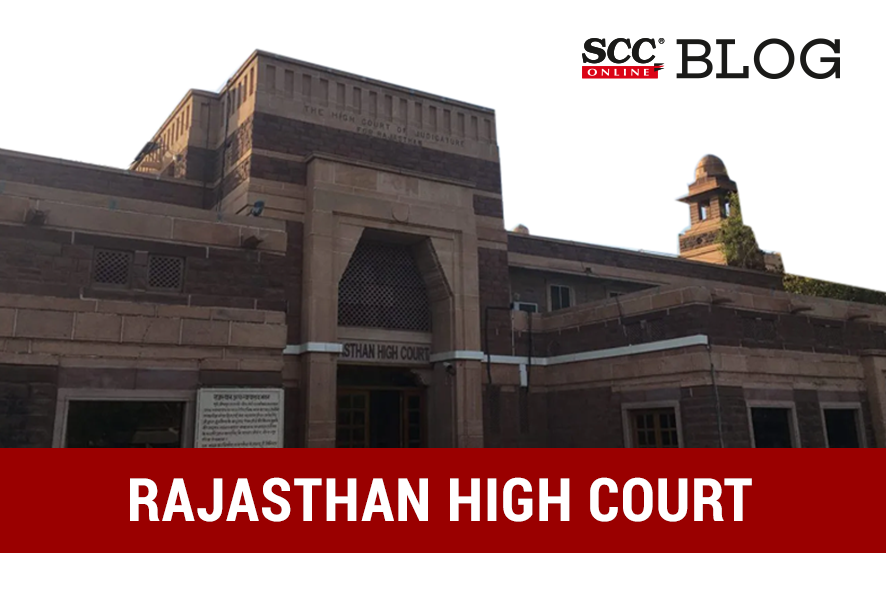Rajasthan High Court: Exercising their power under the writ jurisdiction, the division bench of Yogendra Kumar Purohit and Sandeep Mehta*, J.J., held that the record of conviction of the child in conflict, cannot be preserved and has to be destroyed and as a direct consequence, any disqualification entailing from the conviction would have to be ignored and cannot act to the detriment of the child in conflict with law in any manner, which would include a selection process for public employment.
In the matter at hand, State of Rajasthan challenged the validity of the order passed by the single judge bench whereby the candidature of the respondent for the post of Constable was rejected on the ground that a criminal case was pending against him, a fact that came to light during the police verification and the said rejection was assailed on the ground that the criminal case was registered in the year 2011, at a point when he was a juvenile within the meaning of the Juvenile Justice (Care and Protection of Children) Act, 2000 (‘JJ Act, 2000’) and as such, by virtue of the mandate of Section 24 of the Juvenile Justice (Care and Protection of Children) Act, 2015 (‘JJ Act, 2015’), the respondent was entitled to be under protective umbrella against use of criminal antecedents in any future recruitment process.
It was contended by the respondent that on the date of passing of the impugned order by the single judge bench, the case was still under trial, and he had not been convicted for any offence. Additionally, it was contended that even in the case of conviction, protection of Section 24 of the JJ Act, 2015 was required to be extended to the respondent as the factum of conviction could not act as a disqualification.
However, the State had contended that the respondent had been convicted for the offence punishable under Section 302 of the Penal Code, 1860 (‘IPC’), a crime of a heinous nature thus should not be considered for appointment for such a responsible position. They further contended that after the rejection of the candidature of the respondent, the Juvenile Justice Board (‘JJB’) concluded the enquiry and held the respondent guilty for offences punishable under Section 302 & 201 of IPC therefore, the single judge bench was not justified in exercising the powers of judicial review so as to interfere in the just and rightful decision of the employer in rejecting the candidature of the respondent.
The Court was of the view that the respondent was a young boy of about 14.5 years on the date of the incident and thus, enquiry was held against him in the JJB concerned as per the provisions of the JJ Act, 2000.
The Court opined that even though it was not called upon to comment on the merits of the criminal case registered against the respondent or the judgment of JJB, but upon perusing the records, the Court was of the view that the case of the prosecution was based purely on circumstantial evidence, and that too, the sole circumstance of his ‘last seen’ theory.
The Court noted that the allegation of ‘last seen’ theory was not incorporated in the first report of the incident given to the police, i.e., the missing person report.
“Whether or not this significant omission would invalidate the prosecution allegations, would be for the competent court to consider, before which the judgment of conviction is assailed, but we definitely are of the prima facie opinion that this allegation has been incorporated in the prosecution case through a sheer improvement.” observed the Court.
The Court held that a perusal of the language of Section 24 of the JJ Act, 2015 and the corresponding provision of Section 19 of the JJ Act, 2000 would make it clear that the record of conviction of the child in conflict, cannot be preserved and has to be destroyed. As a direct consequence, any disqualification entailing from the conviction would have to be ignored and cannot act to the detriment of the child in conflict with law in any manner, which would include a selection process for public employment.
With this observation, the Court upheld the order passed by the single judge bench stating that it does not suffer from any infirmity warranting interference.
[State of Rajasthan v Bhawani Shankar Moorh, Division bench Special Appeal Writ 816 of 2022, decided on 13-02-2023]
Judgment authored by Justice Sandeep Mehta
Know Thy Judge| Justice Sandeep Mehta – The 36th Chief Justice of Gauhati High Court
Advocates who appeared in this case :
For the Appellant- Senior Advocate cum Additional Attorney General Sandeep Shah and Advocate Nishant Bafna;
For the Respondent- Advocate Praveen Vyas.






